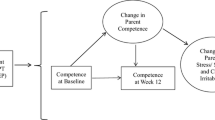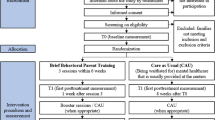Abstract
The Research Units on Pediatric Psychopharmacology—Autism Network reported additional benefit when adding parent training (PT) to antipsychotic medication in children with autism spectrum disorders and serious behavior problems. The intent-to-treat analyses were rerun with putative predictors and moderators. The Home Situations Questionnaire (HSQ) and the Hyperactivity/Noncompliance subscale of the Aberrant Behavior Checklist were used as outcome measures. Candidate predictors and moderators included 21 demographics and baseline measures of behavior. Higher baseline HSQ scores predicted greater improvement on the HSQ regardless of treatment assignment, but no other predictors of outcome were observed. None of the variables measured in this study moderated response to PT. Antipsychotic medication plus PT appears to be equally effective for children with a wide range of demographic and behavioral characteristics.

Similar content being viewed by others
References
Abidin, R. (1995). Parent stress index (3rd ed.). Lutz, Florida: Psychological Assessment Resource.
Aman, M., McDougle, C., Scahill, L., Handen, B., Arnold, L. E., et al. (2009). Medication and parent training in children with pervasive developmental disorders and serious behavior problems: Results from a randomized clinical trial. Journal of the American Academy of Child and Adolescent Psychiatry, 48, 1143–1154.
Aman, M., Singh, N., Stewart, A., & Field, C. (1985). The aberrant behavior checklist: A behavior rating scale for the assessment of treatment effects. American Journal of Mental Deficiency, 89, 485–491.
Arnold, L., Farmer, C., Kraemer, H., Davies, M., Witwer, A., et al. (2010). Moderators, mediators, and other predictors of risperidone response in children with autistic disorder and irritability. Journal of Child and Adolescent Psychopharmacology, 20(2), 83–93.
Barkley, R., Edwards, G., & Robin, A. (1999). Defiant teens: A clinician’s manual for assessment and intervention. New York: Guilford Press.
Baron, R., & Kenny, D. (1986). The moderator-mediator variable distinction in social psychological research: Conceptual, strategic, and statistical considerations. Journal of Personality and Social Psychology, 51, 1173–1182.
Chowdhury, M., Aman, M., Scahill, L., Swiezy, N., Arnold, L. E., et al. (2010). The home situations questionnaire-PDD version: Factor structure and psychometric properties. Journal of Intellectual Disability Research, 54, 281–291.
Gadow, K., & Sprafkin, J. (2002). Child symptom inventory-4 screening and norms manual. Stony Brook, NY: Checkmate Plus.
Hayes, A., & Matthes, J. (2009). Computational procedures for probing interactions in OLS and logistic regression: SPSS and SAS implementations. Behavioral Research Methods, 41, 924–936.
Johnson, C. J., Handen, B. L., Butter, E. M., Wagner, A., Mulick, J. A., et al. (2007). Development of a parent training program for children with pervasive developmental disorders. Behavioral Interventions, 22, 201–221.
Kazdin, A., & Weisz, J. (1998). Identifying and developing empirically supported child and adolescent treatments. Journal of Consulting and Clinical Psychology, 66, 19–36.
Kraemer, H., & Blasey, C. (2004). Centring in regression analyses: A strategy to prevent errors in statistical inference. International Journal of Methods in Psychiatry Research, 13, 141–151.
Kraemer, H., Kiernan, M., Essex, M., & Kupfer, D. (2008). How and why criteria defining moderators and mediators differ between the Baron & Kenny and MacArthur approaches. Health Psychology, 27, S101–S108.
MTA Cooperative Group. (1999). Moderators and mediators of treatment response for children with attention-deficit/hyperactivity disorder. Archives of General Psychiatry, 56, 1088–1096.
Mullen, E. M. (1995). Mullen scales of early learning. Circle Pines: AGS Publishing.
Owens, E. B., Hinshaw, S. P., Kraemer, H. C., Arnold, L. E., Abikoff, H. B., Cantwell, D. P., et al. (2003). What treatment for whom for ADHD: Moderators of treatment response in the MTA. Journal of Consulting and Clinical Psychology, 71(3), 540–552.
Research Units on Pediatric Psychopharmacology Autism Network. (2002). Risperidone in children with autism and serious behavioral problems. The New England Journal of Medicine, 347(5), 314–321.
Research Units on Pediatric Psychopharmacology Autism Network. (2007). Parent training for children with pervasive developmental disorders: A multi-site feasibility trial. Behavioral Interventions, 22, 179–199.
Roid, G. H. (2003). Stanford-Binet intelligence scales (5th ed.). Rolling Meadows, IL: Riverside Publishing.
Roid, G., & Miller, L. (1998). Leiter International Performance Scale-Revised. Wood Dale, IL: Stoelting.
Scahill, L., Aman, M., McDougle, C., Arnold, L. E., McCracken, J., et al. (2009). Trial design challenges when combining medication and parent training in children with pervasive developmental disorders. Journal of Autism and Developmental Disorders, 39, 720–729.
Scahill, L., McDougle, C., Williams, S., Dimitriopoulos, A., Aman, M., et al. (2006). The children’s Yale-Brown obsessive-compulsive scale modified for pervasive developmental disorders. Journal of the American Academy of Child and Adolescent Psychiatry, 45, 1114–1123.
Sparrow, S., Carrey, N., Wiggins, D., Millin, R., & Hosendocus, S. (1984). Vineland adaptive behavior scales. Circle Pines, MN: American Guidance Service.
Acknowledgments
This work was funded by the National Institute of Mental Health by the following RUPP grants: Ohio State University, U10MH66768; Indiana University, U10MH66766; and Yale University, U10MH66764. Johnson & Johnson Pharmaceutical Research & Development provided active risperidone for the study.
Author information
Authors and Affiliations
Corresponding author
Additional information
Clinical trial registration information RUPP PI PDD: Drug and Behavioral Therapy for Children with Pervasive Developmental Disorders. URL: http://www.clinicaltrials.gov. Unique identifier: NCT00080145.
Rights and permissions
About this article
Cite this article
Farmer, C., Lecavalier, L., Yu, S. et al. Predictors and Moderators of Parent Training Efficacy in a Sample of Children with Autism Spectrum Disorders and Serious Behavioral Problems. J Autism Dev Disord 42, 1037–1044 (2012). https://doi.org/10.1007/s10803-011-1338-2
Published:
Issue Date:
DOI: https://doi.org/10.1007/s10803-011-1338-2




